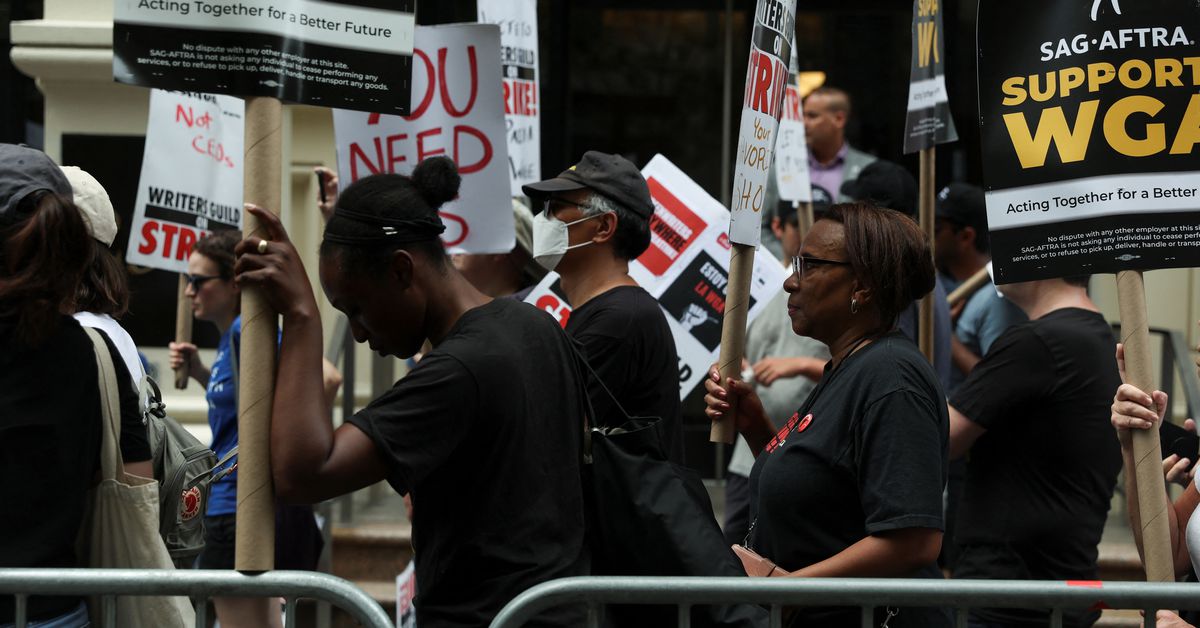- cross-posted to:
- [email protected]
- [email protected]
- news
- cross-posted to:
- [email protected]
- [email protected]
- news
LOS ANGELES, July 13 (Reuters) - Hollywood actors went on strike on Thursday after talks with studios broke down, joining film and television writers who have been on picket lines since May and deepening the disruption of scores of shows and movies.
Hollywood studios now face their first dual work stoppage in 63 years, forcing them to halt many productions across the United States and abroad. The twin strikes will add to the economic damage from the writers walkout, delivering another blow to an industry struggling with changes to its business.
Both SAG-AFTRA — Hollywood’s largest union, representing 160,000 film and television actors — and the Writers Guild of America (WGA) are demanding increases in base pay and residuals in the streaming TV era plus assurances that their work will not be replaced by artificial intelligence (AI).
The actors’ union announced at a Thursday press conference that the strike will begin at midnight.
Fran Drescher, former star of “The Nanny” TV show and the president of SAG-AFTRA, called the studios’ responses to actors’ concerns “insulting and disrespectful.”
“The companies have refused to meaningfully engage on some topics and on others completely stonewalled us,” she said in a statement after a deadline for actors to agree on a new contract expired at midnight on Wednesday. “Until they do negotiate in good faith, we cannot begin to reach a deal.”
The Alliance of Motion Picture and Television Producers (AMPTP), the trade association that negotiates on behalf of Netflix Inc (NFLX.O), Walt Disney Co (DIS.N) and other production companies, said it was “deeply disappointed that SAG-AFTRA has decided to walk away from negotiations.”
The group said it had offered “historic pay and residual increases” and “a groundbreaking AI proposal that protects actors’ digital likenesses.” Actors are worried that their digital images will be used without their permission or proper compensation.
“Rather than continuing to negotiate, SAG-AFTRA has put us on a course that will deepen the financial hardship for thousands who depend on the industry for their livelihoods,” the AMPTP said.
ECONOMIC DAMAGE
The strike by roughly 11,500 writers has sent late-night television talk shows into endless reruns, disrupted most production for the fall TV season and halted work on big-budget movies.
A walkout by SAG-AFTRA, which represents actors from bit-part players to Hollywood’s biggest movie stars, will effectively shutter the studios’ remaining U.S.-based productions of film and scripted television.
It will also hamper many overseas shoots involving SAG-AFTRA talent, such as Paramount Pictures’ sequel to “Gladiator,” which director Ridley Scott has been shooting in Morocco and Malta.
Some production work not involving SAG-AFTRA performers could proceed, such as location scouting or certain kinds of post-production editing. But the loss of actors, who will also not do any promotional work for the film and television productions while on strike, will put more pressure on media companies to find a resolution.
Hollywood has not faced simultaneous strikes since 1960, when members of the WGA and the Screen Actors Guild both walked off the job in a fight over residuals from films sold to TV networks.
Bob Iger, whose contract as Disney’s CEO was this week extended to the end of 2026, told CNBC on Thursday that the writers’ and actors’ unions had unrealistic expectations.
“It’s very disturbing to me,” Iger said, noting the entertainment industry’s ongoing recovery from the disruption of the COVID-19 pandemic. “This is the worst time in the world to add to that disruption.”
Actors say the rise of the streaming era has made it harder to earn their livelihoods, especially for the many thousands of SAG-AFTRA members who are not household names.
“You have to make $26,000 a year to qualify for your health insurance and there are a lot of people who get across that threshold through their residual payments,” actor Matt Damon said at a promotional event held for the film “Oppenheimer” on Wednesday. “There’s money being made and it needs to be allocated in a way that takes care of people who are on the margins.”
Many streaming services, however, have yet to turn a profit after companies spent billions of dollars on programming to try and attract customers.
Disney, Comcast Corp’s (CMCSA.O) NBCUniversal and Paramount Global (PARA.O) each lost hundreds of millions of dollars from streaming in the most recent quarter. At the same time, the rise of online video has eroded television ad revenue as traditional TV audiences shrink.
The WGA’s work stoppage has rippled throughout California and beyond, hitting caterers, prop suppliers and others who rely on Hollywood production for business. The economic damage is expected to spread if actors also strike.
Broadcast networks have already announced fall schedules heavy with reality shows, which are not affected by the current labor tensions. Independent productions not covered by union contracts also can continue.


